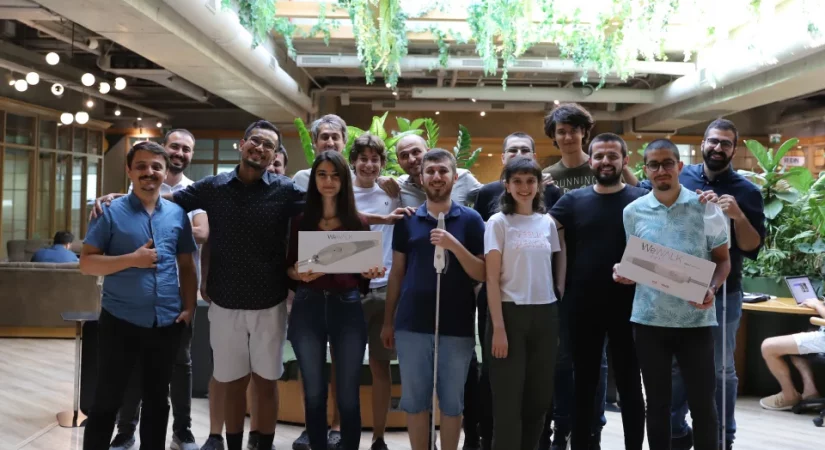WeWalk, a London-based startup creating a “smart cane” for people with visual impairments, has declared that it has obtained £2 million ($2.4 million) in venture capital from prominent investors – including Manchester City and German international footballer İlkay Gündoğan. Founded in 2019, WeWalk has designed a GPS-enabled smart cane and smartphone app to assist the visually impaired with navigating their surrounding environment. Time listed the WeWalk Smart Cane as one of the “best inventions” of 2019.
The cane, priced at approximately $600, can detect objects on the sidewalk and alert the user through vibrations and noises. Additionally, the app integration offers turn-by-turn direction. Last year, WeWalk announced a collaboration with Moovit, owned by Intel, to introduce local transit data into the system.
The cane, costing around $600, can identify items on the pavement and alert the user through vibrations and sounds. Furthermore, the app integration provides turn-by-turn navigation. Last year, WeWalk declared a partnership with Intel-owned Moovit to integrate local transit data into the system. Now, WeWalk is looking to use its new funds to improve its product with computer vision capabilities, created in a tie-up with Imperial College London and the Royal National Institute of Blind People (RNIB).
The aim is to construct something that can identify road signs, state the number on the front of a bus, or even recognize an object in its path; however, what this will involve is still uncertain.
Aiming to maximize sensor efficiency and cost-effectiveness, Jean Marc Feghali, the R&D lead for WeWalk, informed TechCrunch that they are utilizing smartphone sensing when necessary. In addition, they are researching the current technology to figure out what can be achieved with various form factors.
This initiative could gain from WeWalk’s current collaboration with Microsoft as part of its AI for Accessibility program, which could bring about more profound integrations with Microsoft’s Seeing AI app or Azure ML, as suggested by Feghali.
The business has already commenced work on the venture, enlisting approximately 30 people to construct and assess the essential software and hardware.
Feghali stated that the RNIB is assisting with user-testing and guaranteeing that the designs are centred around people. Imperial College is aiding with the sensing algorithms. A product that is small and unobtrusive, while still providing its sensors with a broad field of view and not hindering the user’s natural motion, is what we imagine. We will then look into different methods of feedback such as auditory and tactile to provide the user with the information vital for their safe mobility.
The company announced that it is already testing camera and remote-human assistance features within the WeWalk mobile app, with the aim of having a product ready for the market by 2024. This is being used as a “design platter” to add further computer vision tools in the future.
The organization declared that it is already experimenting with camera and remote-human assistance functions in the WeWalk mobile app, with the goal of having a finished product available by 2024. This is being utilized as a “design platter” to integrate more computer vision tools in the foreseeable future.
Our goal is to expand our company worldwide and upgrade our technology to provide more useful, relevant data to those who are visually impaired, elderly, or have limited mobility,” said Gökhan Meriçliler, Co-Founder and CEO of WeWalk.
Nesta, KHP Ventures and APY Ventures led the financing of WeWalk, with public investors through Crowdcube and, notably, footballer İlkay Gündoğan, also participating.
Source: techcrunch.com
